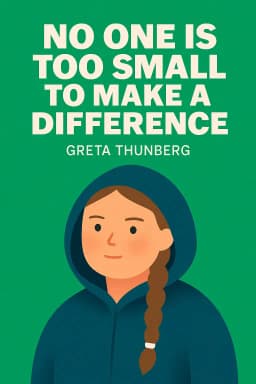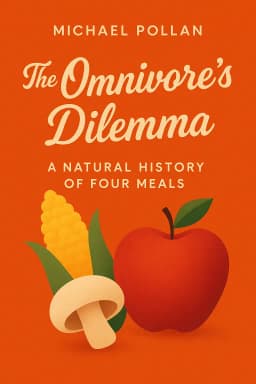
The Avocado Paradox
Golden Hook & Introduction
SECTION
Mark: What if the most environmentally friendly choice you make today is buying a plastic-wrapped avocado flown halfway across the world? And what if feeling guilty about it is actually part of the problem? Michelle: Hold on, that sounds like something a fossil fuel lobbyist would whisper in my ear at night. My brain just did a somersault. Are you serious? A plastic-wrapped, jet-setting avocado is better than a local apple? Mark: In some very specific and important ways, yes. And that delightful short-circuit in your brain is exactly why we need to talk about the book we're diving into today: Not the End of the World by Dr. Hannah Ritchie. Michelle: Ah, okay, this is making more sense. She’s the data scientist from Oxford and the Deputy Editor at Our World in Data, the place that basically became the world’s dashboard during the pandemic. Mark: The very one. And what makes this book so compelling is that it’s not written from an ivory tower. Ritchie herself admits she spent her university years completely paralyzed by eco-anxiety, convinced the world was ending. This book is the story of her journey out of that despair, guided by data. Michelle: That makes it feel much more authentic. It’s not just someone telling us not to worry; it’s someone who’s been in that dark place and found a way out. But I have to ask, how can you not feel a little doomed? Every headline is about a new "hottest year on record," or another species going extinct. It feels relentless. Mark: It does feel relentless. And Ritchie argues that this constant barrage of doomsday thinking, while well-intentioned, has become one of the biggest roadblocks to actually solving the problems.
The Tyranny of Doom: Why Our Environmental Anxiety Might Be Misguided
SECTION
Michelle: Okay, I need you to unpack that, because it sounds dangerously close to complacency. Isn't that fear a motivator? Don't we need people to be scared to get them to act? Mark: That’s the common wisdom, right? We need to shake people awake. But Ritchie points to some pretty stark data. A recent global survey found that more than three-quarters of young people think the future is frightening. Over half believe humanity is doomed. And two in five are hesitant to even have children because of climate change. Michelle: Wow. I’ve heard people say that, but seeing the numbers is chilling. That’s not motivation; that’s despair. Mark: It's paralysis. And it’s a story we’ve heard before. Ritchie brings up the classic example of the biologist Paul Ehrlich, who became famous in the 70s for his doomsday predictions. He wrote a bestseller, The Population Bomb, and made these incredibly specific, terrifying forecasts. He claimed that "sometime in the next 15 years, the end will come," and even that "England will not exist in the year 2000." Michelle: And, spoiler alert, I’m pretty sure I had tea in London well after the year 2000. So what happened? Mark: What happened is that he was spectacularly wrong. Human ingenuity, agricultural revolutions, and changing demographics completely altered the trajectory. But the damage was done. When scientists make these apocalyptic claims and they don't come true, it erodes public trust. People either tune out the constant alarm, or they fall into a state of learned helplessness, thinking, "If we're doomed anyway, why bother?" Michelle: I can see that. It’s like a boy who cried wolf, but the wolf is a planet-sized catastrophe. So what was the turning point for Ritchie? How did she get out of that mindset? Mark: It was a single presentation. One night, feeling completely burnt out from her environmental science studies, she stumbled upon a video of a Swedish statistician named Hans Rosling. Michelle: Oh, the guy with the bubbles! The one who made statistics look like a beautiful, moving art form. Mark: That’s him. And in his presentation, Rosling used decades of data to show that on almost every metric of human well-being—child mortality, poverty, literacy, hunger—the world was not getting worse. It was getting dramatically, unbelievably better. For Ritchie, it was like turning on a light in a dark room. She realized her entire worldview, shaped by headlines and academic pessimism, was built on a foundation that was missing half the story. Michelle: The story of human progress. We’re so focused on the environmental bill that’s come due that we’ve forgotten to look at what we bought with all that carbon. Mark: Precisely. And this is where she introduces the idea of "conditional optimism." It’s not blind optimism, where you just believe everything will be fine. It’s the belief that if we do the right things, we can solve these problems. It’s an optimism that is earned through action. It reframes the narrative from "we are the last generation, doomed to watch it all burn" to "we can be the first generation to build a truly sustainable world." Michelle: Okay, I like that. It’s not about ignoring the fire. It’s about recognizing we have the tools to build a fire truck and the knowledge to put the fire out. It shifts the focus from the problem to the solution. Mark: Exactly. It’s the difference between telling someone "Your house is on fire and you're going to die" versus "Your house is on fire, here is the extinguisher, and here is how you use it." One creates panic, the other creates a firefighter. Michelle: That’s a powerful reframe. So if we adopt this new mindset, this conditional optimism, what does the toolkit of a modern-day environmental firefighter actually look like? I have a feeling it’s not just about recycling my yogurt cups more diligently. Mark: You have no idea. And this is where things get really interesting, and frankly, where the book becomes quite controversial. The toolkit for fixing the planet often looks nothing like what we’ve been told.
The Great Decoupling: Unpacking the Counter-intuitive Toolkit for a Sustainable Planet
SECTION
Michelle: Alright, hit me with it. Let's go back to your jet-setting, plastic-wrapped avocado. Defend that statement. Mark: I will. But first, let’s talk about a concept that underpins all of this: decoupling. For most of human history, progress was tied to destruction. To get richer, to build cities, to feed more people, we had to burn more stuff, chop down more trees, and pollute more rivers. Growth was coupled with environmental harm. Michelle: That makes sense. The Industrial Revolution wasn't exactly a win for clean air. Mark: Not at all. But what the data now shows is that many wealthy countries have started to break that link. They've achieved the holy grail: decoupling. Their economies are still growing, but their emissions are falling. The UK’s emissions have halved since 1990 while its economy has grown by 50%. The US has seen a similar trend since 2005. Michelle: But wait, the common critique there is that they’ve just offshored their pollution, right? They’ve just moved the dirty factories to other countries and are importing the goods. Mark: A fantastic and crucial question. Ritchie addresses this head-on. When you account for trade and look at "consumption-based emissions," the trend still holds. The reductions are real. It's happening because of a fundamental shift in technology and policy. And the most dramatic example of this isn't in Europe or the US. It's in Beijing. Michelle: Beijing? I thought the air quality there was legendary for all the wrong reasons. The 'Airpocalypse.' Mark: It was. In 2013, the air was so thick with smog that it was literally off the charts of the US Embassy's air quality index. Life expectancy was years lower than in the south of the country because of the pollution. The public was furious. They were sharing photos of the smog, demanding action. It became a crisis of political legitimacy. Michelle: So what did the government do? Mark: They declared a "war on pollution." And it wasn't just rhetoric. They poured billions into it. They shut down coal plants around the city, switched millions of homes and businesses from coal to gas boilers, implemented strict regulations on industry, and took older, polluting cars off the road. It was a massive, systemic overhaul. Michelle: And did it work? Mark: The results are staggering. In less than a decade, from 2013 to 2021, Beijing cut its air pollution by 40%. The average citizen can expect to live more than four years longer because of it. When the Winter Olympics were held there in 2022, the athletes were competing under blue skies. It’s one of the most stunning environmental success stories of our time, and it proves that rapid, large-scale change is possible when there's political will. Michelle: That is a story you absolutely never hear. It completely upends the narrative that environmental problems take generations to fix or that authoritarian states don't care. But it sounds expensive and top-down. What about the choices regular people make? Let's get back to the supermarket aisle. What about something like palm oil? Mark: Ah, palm oil. The villain in every environmental documentary. The destroyer of orangutan habitats. We've all seen the campaigns, the boycotts. Ben & Jerry's proudly states they don't use it. Michelle: Exactly. I actively avoid products with palm oil. I thought that was what a good environmentalist does. Mark: And Ritchie argues that this is a perfect example of our intuition leading us astray. The problem isn't palm oil itself; the problem is that it's an incredibly, almost miraculously, efficient crop. To get the same amount of vegetable oil from soybeans, you’d need about six times more land. For coconuts or olives, it's even more. Michelle: Whoa, hold on. So if we all boycotted palm oil and companies switched to, say, soybean oil, we would actually need more farmland, which would lead to more deforestation somewhere else? Mark: That is the very real risk. It’s a classic case of what ecologists call a "second-order effect." The solution isn't to boycott palm oil, which would just shift the problem and likely make it worse. The solution is to demand and support sustainable, certified palm oil that is grown on existing agricultural land, not on newly cleared rainforest. It requires a more nuanced approach than a simple "good vs. evil" label. Michelle: My whole shopping philosophy is crumbling. This is what you meant by the avocado. Mark: This is exactly what I meant. A study in the UK found that a locally grown tomato, raised in a heated greenhouse during the winter, can have a much larger carbon footprint than an avocado grown in the sun in Mexico and shipped over. The "food miles" are only one tiny part of the equation. The energy used to grow it, the type of land, the efficiency of transport—it's all part of a complex system. Sometimes, the plastic wrap that we instinctively hate is what prevents food waste, which has a massive environmental footprint. Michelle: So being an effective environmentalist means I have to become a data scientist and carry a spreadsheet to the grocery store? Mark: Not quite. It means we need to stop stressing about the small, symbolic things that feel "natural" and start focusing on the big things that data shows actually move the needle.
Synthesis & Takeaways
SECTION
Michelle: Okay, my brain is officially rewired. The big takeaway here isn't just 'don't worry, be happy.' It's that being an effective environmentalist might mean feeling like a bad one sometimes. It means trusting data over your gut, choosing the "unnatural" but efficient solution, and focusing on big, systemic levers instead of small, symbolic gestures. Mark: That's the heart of it. Ritchie's ultimate point is that for the first time in human history, we have the wealth, the technology, and the knowledge to achieve both human well-being and environmental sustainability. For millennia, we couldn't have both. We solved the first half of the equation—lifting billions out of poverty and doubling life expectancy. The data now shows we've hit the turning point on the second half. Michelle: The Great Decoupling. Mark: The Great Decoupling. The question is no longer if we can do it. The data says we can. The question is how fast. And that depends on the systems we build and the policies we demand. Michelle: So, what's one thing someone listening can do this week to start practicing this new, data-driven way of thinking? Mark: Ritchie suggests focusing on what she calls the big four personal actions. First, how you travel—flying less and driving less are huge. Second, the energy you use at home—switching to a green energy provider if you can. Third, and this is a big one, what you eat. Reducing meat and dairy consumption, especially beef and lamb, has an outsized impact. And fourth, using your voice for systemic change. Michelle: What does that look like? Mark: It means forgetting the plastic straws for a moment and thinking about who you vote for, what your company's climate policy is, or where your pension is invested. Those are the levers that powered Beijing's transformation. Individual action is good, but collective, systemic action is what will get us there. Michelle: That feels both bigger and, in a way, simpler. It’s about focusing our energy where it counts. We'd love to hear what you all think. What's one environmental 'truth' this conversation made you question? Let us know on our socials. It feels like we could all use a bit of conditional optimism right now. Mark: This is Aibrary, signing off.









